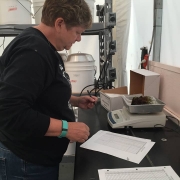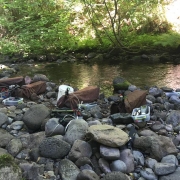Ask any teacher to identify their students’ favorite question. The answer is universal: “Why do I need to learn this?” The Research Experience for Teachers (RET) Program, funded through NSF and LTER, seeks to give teachers the tools to answer this question in ways that excite and engage their students.
Because students may not initially understand the importance of a topic, teachers know hands-on experience is the best way to persuade them that the material is worth investigating — and possibly, has genuine relevance to their lives. Thus, this summer, 15 teachers across the nation are going above and beyond in order to provide their students with a genuine research experience next school year.
Instead of lying on the beach, these teachers will spend their summers collecting their own data at various LTER sites and creating lesson plans that can be shared with other teachers throughout the network. In turn, this exposes their students to real life data in STEM fields, making it both tangible and relatable.
A Different Kind of Summer Vacation
Each teacher will be pulling on their boots to complete a unique project collecting data in diverse environments ranging from the Everglades to the Arctic. For example, Connie, a 9-12th grade science teacher in Michigan, will analyze algal blooms in lakes in order to engage students with local algae in the classroom.
Leilagh and Jessica from Cottage Grove High School in Oregon are working on the SCALER project, designed to understand how small scale ecological experiments can be applied to understand structure and function of regional ecosystems. They will reinforce their lessons and experiences in their science and math classes respectively.
Matt, a 6th grade Earth and Space teacher in New Jersey, plans to incorporate authentic Antarctic sea ice and weather data into his oceanography, atmospheric, and sustainability units throughout the school year. Matt shared his enthusiasm, commenting that “being able to collaborate with teachers who share similar passions for bringing real-world science into the classrooms excites me. During the conference call, I found it fascinating how diverse the LTER research studies were.”
Hands-on Research Proves Persuasive
Ultimately, the goal of the RET program is to help these teachers answer that initial student query — to convince students that science is important and worth their attention. Shaun, a 6th and 8th grade teacher at Thornapple Kellogg Middle School, elaborated on the goal of the RET experience, “We’re spending our summers in amazing and diverse locations, conducting research of all different kinds. But every one of us shares a passion for science and a dedication to giving our students an engaging and authentic educational experience.” When teachers participate, they are able to bring first-hand knowledge and experience into the classroom, sharing authentic data and devising research activities for their students.
Together, Teachers Amplify their Impact
Connecting teachers to a larger network of RETs amplifies their experience. Teachers can share resources, discuss what works and what doesn’t, and improve classroom materials for their students. Even before most teachers had begun their research, they were already busy sharing resources, such as the Data Nuggets online library. Data Nuggets is a collection of lesson plans made to bring cutting-edge research and data into the classroom. Mary, a 6th grade science teacher hopes that this tool “will help [students interpret what graphs] mean and how the results relate to their experiments.” RET participants plan to meet again in early August to share their experiences and discuss plans to incorporate their research into the classroom for the upcoming school year.
The RET program is funded through LTER and NSF. This summer, 15 teachers are participating in RETs at 6 LTER research sites (Andrews Forest (AND), Arctic (ARC), Florida Coastal Everglades (FCE), Hubbard Brook (HBR), Kellogg Biological Station (KBS) and Palmer Antarctica (PAL)).












